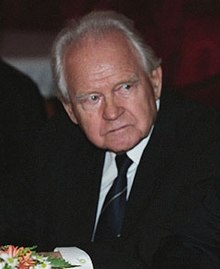
Tikhon Nikolayevich Khrennikov (June 10 [O.S. May 28], 1913 –August 14, 2007) was a Soviet Russian composer, pianist, and leader of the Union of Soviet Composers, writing three symphonies, four piano concertos, two violin concertos, two cello concertos, operas, operettas, ballets, chamber music, incidental music and film music, who was also known for his political activities. Khrennikov was the youngest of ten children, born on June 10 [O.S. May 28], 1913, into a family of horse traders in the town of Yelets, Oryol Governorate, Russian Empire (now in Lipetsk Oblast in central Russia). He learned guitar and mandolin from members of his family and sang in a local choir in Yelets. There he also played in a local orchestra and learned the piano.
As a teenager, Khrennikov moved to Moscow. From 1929 to 1932, he studied composition at the Gnessin State Musical College under Mikhail Gnessin and Yefraim Gelman. From 1932 to 1936, he attended the Moscow Conservatory. There he studied composition under Vissarion Shebalin and piano under Heinrich Neuhaus. As a student, he wrote and played his Piano Concerto No. 1, and his graduation piece was the Symphony No. 1. His first symphony was conducted by Leopold Stokowski. He became popular with the series of songs and serenades that he composed for the 1936 production of Much Ado About Nothing at the Vakhtangov Theatre in Moscow. By the 1930s, Khrennikov was already treated as a leading official Soviet composer. Typical was his speech during a discussion in February 1936 concerning Pravda articles “Chaos instead of music” and “Ballet falseness.”
Together with other official representatives of Soviet culture (Nikolay Chelyapov, Nikolai Myaskovsky, Nikolay Chemberdzhi, Sergei Vasilenko, Victor Bely, Alexander Veprik, Aram Khachaturian, Boris Shekhter, M. Starodokamsky, Georgy Khubov, Vano Muradeli, Vladimir Yurovsky and Lev Kulakovsky), Khrennikov signed the statement welcoming “a sentence of the Supreme Court of the Soviet Union, passed on traitors against the motherland, fascist hirelings, such as Tukhachevsky, Yakir and others. Having adopted the optimistic, dramatic and unabashedly lyrical style favored by Soviet leaders, Khrennikov shot to fame in 1941, with the “Song of Moscow” (or “Swineherd and Shepherd”) from his music score for the popular Soviet film They Met in Moscow, for which he was awarded the Stalin Prize. In 1941, Khrennikov was appointed Music Director of the Central Theatre of the Red Army, a position he would keep for 25 years.
In February 1945 Khrennikov was officially posted by the Political Authority (Politupravlenie) of the Red Army from Sverdlovsk, where he and his family had been evacuated, to the First Belorussian Front, and the Army commanded by General (later Marshal) Chuikov. In 1947 he joined the Communist party and became a deputy of the Supreme Soviet. In 1948, Andrei Zhdanov, the leader of the anti-formalism campaign, nominated Khrennikov as Secretary of the Union of Soviet Composers, and Joseph Stalin appointed him to the job. He held this influential post until the collapse of the Soviet Union in 1991 when the Union of Soviet Composers was disbanded. For a long time it was held that, thanks to Khrennikov’s efforts, no Soviet composers were arrested or prosecuted.
In 1949 Khrennikov officially attacked the young composer Alexander Lokshin. Khrennikov’s speech aroused great indignation in Mikhail Gnessin. The ideological campaigns of 1948-49 against “formalists” in music were directly connected with the offensive against the so-called rootless cosmopolitans, which formed a part of the state anti-Semitism in the Soviet Union that flourished after the Second World War.m mKhrennikov and other functionaries of the Composers‘ Union constantly attacked the heritage of the Russian avant-garde as well as its researchers. Khrennikov was a Member of Central Committee of the Communist Party of the Soviet Union from the 1950s on. From 1962, he was a representative in the Supreme Soviet of the USSR. In his last years, Khrennikov made extremely negative statements about Perestroika, its leaders, the fall of the Soviet Union and the liquidation of corresponding structures: Khrennikov’s memoirs were published in 1994 after the fall of the Soviet Union. He died in Moscow on August 14, 2007, aged 94, and is buried near his parents’ tomb in his native town of Yelets.
The following works by Tikhon Khrennikov are contained in my collection:
Piano Concerto No. 2, op. 21.
Piano Concerto No. 3, op. 28.
Violin Concerto No. 1, op. 14.
Violin Concerto No. 2, op. 23.